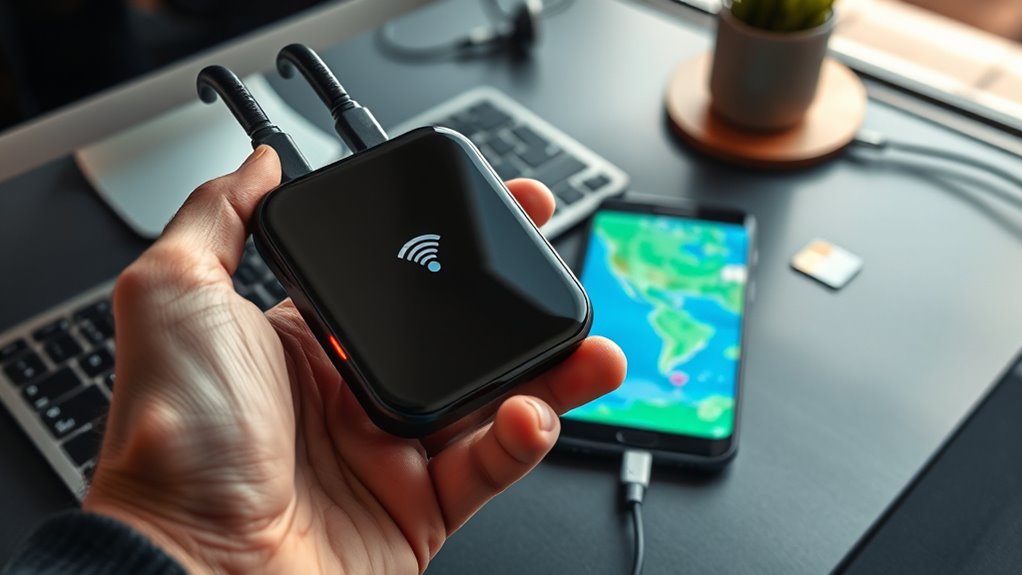Choosing between hotspots and SIM cards depends on your needs for security, cost, and convenience. Hotspots are portable devices that connect multiple gadgets, ideal for travel, but may have higher upfront costs. SIM cards fit directly into devices and offer flexible plans and better security. Understanding their features helps you pick what suits your lifestyle best. Keep exploring to discover how each option can keep you connected effortlessly.
Key Takeaways
- Hotspots offer portable Wi-Fi for multiple devices, ideal for frequent travelers needing quick, flexible internet access.
- SIM cards provide direct device connectivity with lower costs and easy plan management, suitable for seamless device switching.
- Hotspots typically require upfront device purchase and battery management, whereas SIMs usually involve lower initial costs and simple insertion.
- Coverage reliability varies; SIM cards often ensure more consistent service across urban and rural areas.
- Security features differ, with embedded SIMs generally offering better protection against hacking and unauthorized access.
How Hotspots Work and Their Key Features
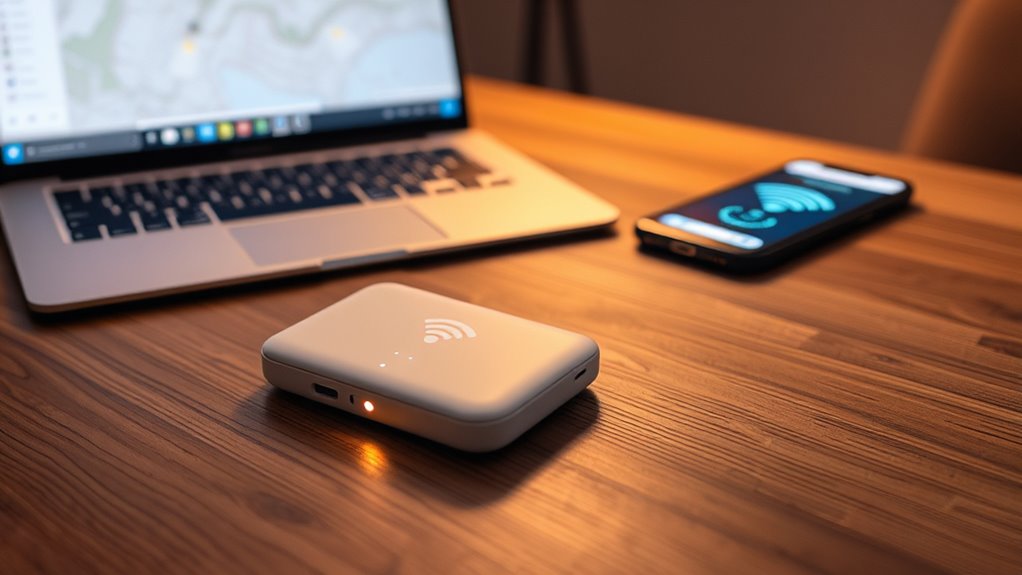
Hotspots are portable devices that provide internet access by connecting to cellular networks. They act as mini Wi-Fi routers, allowing you to connect multiple devices on the go. One key feature is their ease of use—simply turn on the device, select your network, and connect. However, security concerns are important; since hotspots transmit data wirelessly, they can be vulnerable to hacking if not properly secured. Battery life is another essential factor; many hotspots rely on rechargeable batteries, so heavy use can drain power quickly, limiting your connectivity. To maximize your experience, choose a hotspot with strong security features and good battery performance. Being aware of these aspects helps you stay connected safely and efficiently, wherever you are. Additionally, understanding the essential oils for hotspot maintenance, such as improving device longevity and reducing overheating, can further enhance your connectivity experience. Regularly updating your device’s firmware and applying security patches can also help protect your data and improve performance security features. Incorporating smart home integration practices can optimize your network management and device security further. Moreover, selecting a hotspot with high-speed connectivity ensures smoother streaming, browsing, and gaming sessions. Staying informed about battery management techniques can also help extend device lifespan and ensure consistent connectivity.
Understanding SIM Cards and Their Functionality
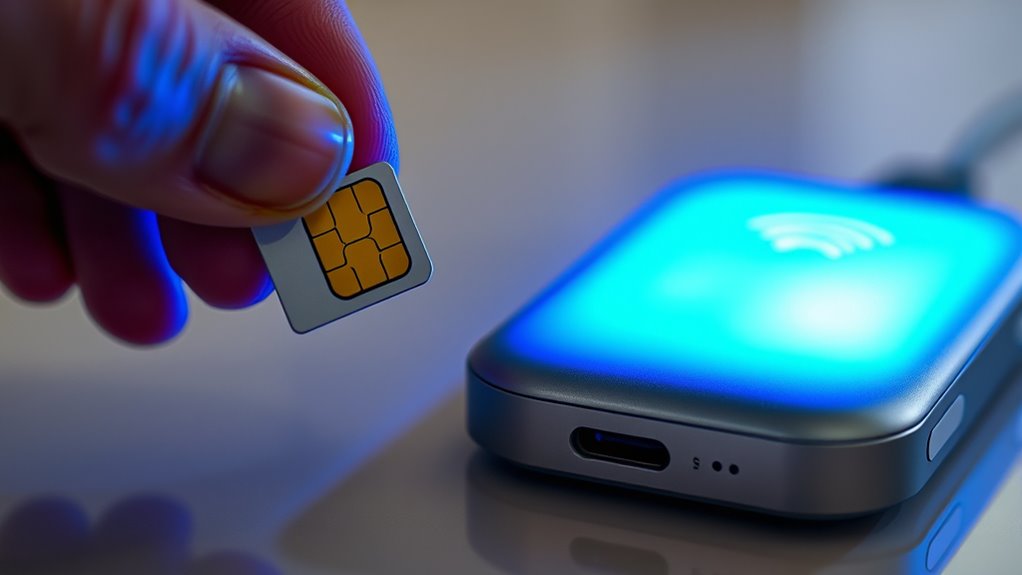
A SIM card, or Subscriber Identity Module, is a small chip that stores essential data allowing your device to connect to a cellular network. During SIM card manufacturing, manufacturers embed security features to protect your information, such as encryption and unique identifiers. These security features prevent unauthorized access and fraud, ensuring your data remains safe. These features also relate to the broader concept of spiritual energy protection, which involves safeguarding your energetic boundaries. The SIM holds your phone number, carrier details, and network authentication keys, enabling seamless connectivity. When you insert a SIM into your device, it communicates with your carrier’s network, authenticating your identity. Understanding how SIM cards work helps you appreciate their role in maintaining secure, reliable communication. Additionally, familiarity with tableware materials can enhance your appreciation of the craftsmanship behind various products used in dining and living spaces. Knowing about support hours for service centers can help you plan visits more effectively and avoid unnecessary delays. Recognizing the importance of network security protocols further emphasizes how safeguarding digital data parallels protecting your personal energy. Moreover, awareness of home decor elements can enrich your understanding of creating harmonious living environments.
Comparing Cost and Data Plans for Hotspots and SIMs
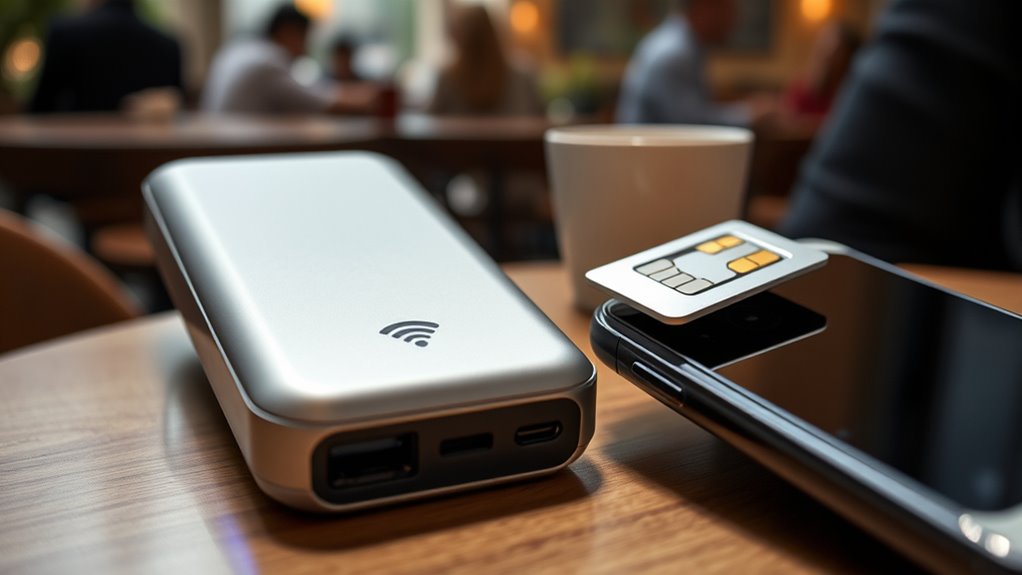
When comparing cost and data plans for hotspots and SIMs, you’ll notice significant differences in pricing options. Flexibility in data plans can vary widely, affecting how you use your connection daily. Understanding these factors helps you choose the most cost-effective solution for your needs. Additionally, evaluating the quality of materials used in devices can impact their durability and long-term performance. Many providers are now offering customizable plans to better suit individual usage patterns and preferences. Considering the dog names or breed-specific traits can also influence your choice of device or plan, especially if you want a connection that complements an active or outdoor lifestyle. Moreover, performance tuning of connected devices can further optimize your experience, particularly for high-demand applications. Incorporating AI security measures into your setup can enhance data protection and mitigate cyber threats.
Cost Differences Explored
Understanding the cost differences between hotspots and SIM cards is essential for making the most economical choice for your connectivity needs. Hotspots often come with upfront device costs and monthly plans that include data caps, which can add up over time. Additionally, hotspots may require more maintenance and troubleshooting, which could incur extra expenses. Choosing the right option depends on your usage patterns and specific needs. SIM cards, on the other hand, typically offer flexible, pay-as-you-go options that might suit irregular usage. Key factors to consider include:
- Pricing structure – Hotspots may require a larger initial investment, while SIM plans often have lower entry costs.
- Security concerns – SIM cards generally offer better security since they’re integrated into your device, reducing hacking risks. Many devices now incorporate embedded SIM technology, enhancing security and ease of use.
- International compatibility – SIMs often work seamlessly across borders, whereas hotspots may require additional configurations or devices.
- Relationship with device security – Since SIM cards are embedded, they can provide enhanced security and privacy, making them a safer choice for sensitive information. Furthermore, understanding the security features of each option can help prevent data breaches and protect personal information.
- Effectiveness of security measures – As highlighted in Patchology.ORG, choosing trusted and certified providers can ensure better security and quality assurance for your connectivity devices.
Data Plan Flexibility
While both hotspots and SIM cards offer flexible data plans, their cost structures and options vary considerably. Hotspots often come with pre-set plans that limit device compatibility and may have more network restrictions, which could impact your choice. SIM cards, on the other hand, typically provide more customizable data plans and wider device compatibility, allowing you to switch devices easily. However, some carriers restrict SIM usage to specific networks, affecting flexibility. Hotspot plans might charge higher fees for additional data, while SIM plans often offer tiered options that suit different usage levels. When comparing the two, consider how device compatibility and network restrictions influence your ability to adapt plans as your needs change over time. Additionally, Sulfate-free options are available for some devices to help maintain optimal performance and prevent potential damage. Understanding service plans can also help you choose the most cost-effective option for your connectivity needs. For example, selecting a Volkswagen Tuning compatible device may enhance your overall experience and performance, similar to optimizing vehicle upgrades for better handling and efficiency. It’s also worth noting that some providers offer data rollover features, which allow unused data to carry over to the next billing cycle, increasing flexibility and value.
Portability and Convenience: Which Option Fits Your Lifestyle?

Choosing between a hotspot and a SIM card largely depends on how portable and convenient you need your internet connection to be. If mobility is key, consider these factors:
- Device Compatibility: Hotspots often work with multiple devices, while SIM cards are typically inserted directly into your device.
- Travel Considerations: Hotspots can be easily moved between locations, making them ideal for frequent travelers.
- Ease of Use: SIM cards require minimal setup, but hotspots can offer more flexibility with multiple device connections.
Your choice hinges on whether you prioritize simplicity, device compatibility, or the ability to switch locations effortlessly. For frequent travel or working on the go, hotspots offer unmatched convenience. If you prefer a straightforward setup, a SIM might suit your lifestyle better.
Coverage and Reliability in Different Environments
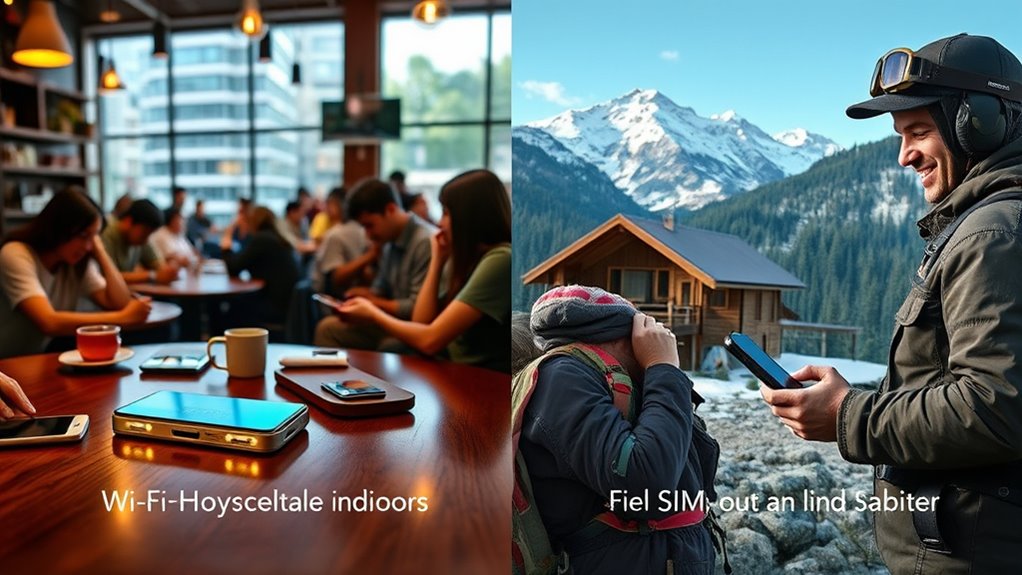
Coverage and reliability can vary markedly depending on your environment, so it’s crucial to consider where you’ll use your internet connection most often. In urban areas, both hotspots and SIM cards generally offer strong signal strength, but network security remains vital to protect your data from cyber threats. Rural or remote locations might present challenges, with coverage gaps that affect connection stability. Hotspots often depend on device compatibility with local networks, which can limit their effectiveness if your device isn’t fully compatible. SIM cards usually provide more consistent coverage in these environments, especially if supported by multiple carriers. Ensuring your device supports necessary network bands and security protocols helps maintain a reliable, secure connection wherever you go. Choosing the right option depends on your environment’s network infrastructure and your device’s compatibility.
Making the Right Choice Based on Your Connectivity Needs
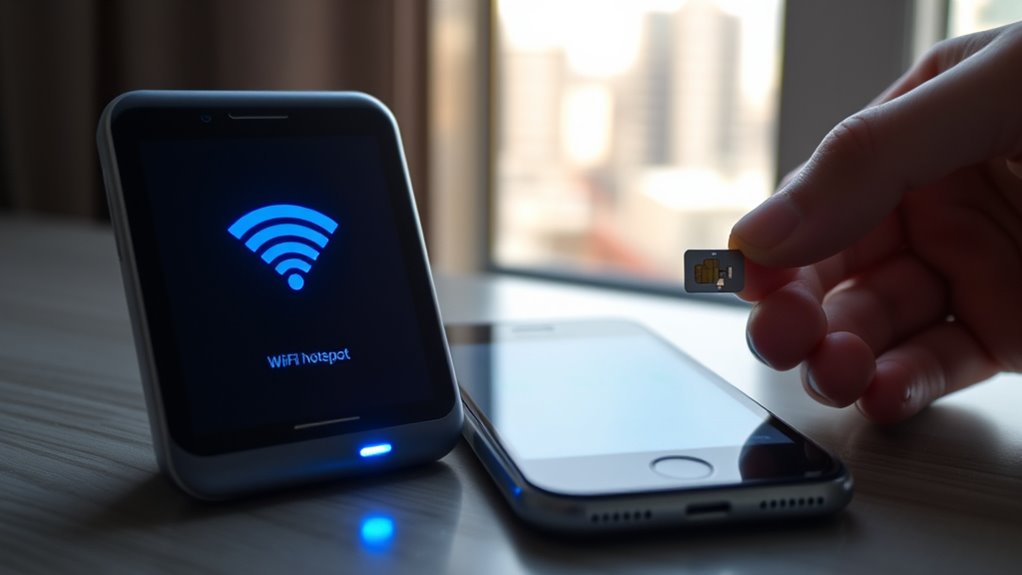
To choose the best option, consider how you plan to use your connection and what fits your budget. Hotspots offer flexibility for multiple devices, but SIM cards can be more cost-effective for long-term use. Evaluating these factors helps you make an informed decision that meets your specific needs.
Usage Flexibility
When considering your connectivity options, understanding the flexibility each offers can make a significant difference. Hotspots often provide quick setup and support multiple devices simultaneously, but their device durability varies, impacting long-term use. SIM cards, on the other hand, offer greater flexibility for switching devices or plans without changing hardware. To evaluate:
- Device durability—hotspots may need careful handling, while SIMs are less prone to damage.
- User interface—hotspots often feature intuitive screens and controls, making them easy to manage.
- Usage adaptability—SIMs allow seamless plan changes, whereas hotspots may restrict customization.
Ultimately, your choice depends on whether you prioritize device durability, ease of use, or plan flexibility. Weigh these factors against your connectivity needs to make an informed decision.
Cost Implications
While understanding the flexibility of hotspots and SIM cards helps you choose the right device, considering their cost implications guarantees your selection fits your budget. Hotspots often have higher upfront costs, especially if you purchase a dedicated device, but they can offer flexible data plans through different pricing strategies. SIM cards typically have lower initial costs, sometimes even free with a compatible device, but ongoing expenses depend on your data usage and plan choices. To make an informed decision, compare upfront costs and evaluate the long-term expenses based on your connectivity needs. Some providers offer prepaid plans with predictable pricing, while others have postpaid options that might be more cost-effective if you use data heavily. Balancing upfront costs and ongoing expenses helps you choose the most economical solution.
Frequently Asked Questions
Can Hotspots Connect Multiple Devices Simultaneously?
Yes, hotspots can connect multiple devices at once, allowing you to share your connection easily. You can often connect several devices, like smartphones, tablets, or laptops, to a single hotspot. Keep in mind, though, that device sharing may affect connection stability, especially if too many devices are connected or bandwidth is limited. To guarantee a smooth experience, choose a hotspot that supports multiple connections and offers strong, reliable signal strength.
Do SIMS Work Internationally Without Additional Charges?
When you use a SIM card internationally, it often works without additional charges through international roaming, but you should check your provider’s policies. Some SIM cards include global coverage, while others may incur extra fees for international roaming. Be aware of SIM card fees, as they can vary depending on your plan and destination. Always verify your carrier’s international options before traveling to avoid unexpected charges.
How Secure Are Hotspots Compared to Sim-Based Connections?
Hotspots are like open doors to hackers, making their security seem almost laughably weak compared to SIM-based connections. While encryption protocols can protect hotspots, network vulnerabilities still loom large, risking your data. SIMs usually offer tighter security because they’re built into the network with advanced encryption. So, if security’s your top priority, a SIM-based connection is like Fort Knox compared to a hotspot’s flimsy lock.
What’S the Battery Life Difference Between Hotspots and Smartphones?
When comparing battery longevity, hotspots typically have shorter battery life than smartphones because of higher power consumption needed to maintain a Wi-Fi signal. Hotspots often drain their batteries quickly, sometimes lasting only a few hours, especially with heavy usage. In contrast, smartphones are designed for better power efficiency, offering longer-lasting battery life even when using data. So, expect hotspots to need more frequent recharging than your smartphone.
Are There Any Data Speed Limitations for Hotspots or SIMS?
You might wonder if hotspots or SIMs face data speed limits. Both rely on network coverage, which varies by area. Hotspots and SIMs can experience data throttling if you exceed your data cap, slowing down your speeds. Keep in mind, network congestion can also affect speeds, so you may see slower connections during busy times. Staying aware of your plan’s limits helps you avoid unexpected slowdowns.
Conclusion
So, now that you’ve peeked behind the scenes of hotspots and SIM cards, you’re ready to choose your perfect connectivity sidekick. Whether you crave unlimited data or just need a quick fix on the go, remember—your choice might just define your next Wi-Fi disaster or miracle. So go ahead, pick wisely, and enjoy the thrill of staying connected—or not. After all, what’s life without a little unpredictable buffering?
